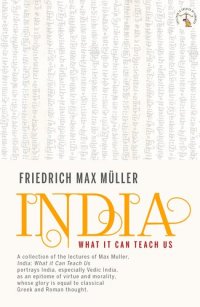
Ebook: India: What Can It Teach Us?
Author: Friedrich Max Müller
A collection of the lectures of Max Muller, India: What it Can Teach Us portrays India, especially Vedic India, as an epitome of virtue and morality, whose glory is equal to classical Greek and Roman thought.
Muller, in these essays, urges the West to abandon their superior colonial mind-set to adopt the multi-dimensional efficacy that is inherent to Indian culture.
This is the kind of book that should be in the possession of all Indians and India-lovers, travelers to India, or those wanting to under-stand this ancient and mystical land.
WHY?
Read this extract from F. Max Müller, one of the foremost foreign scholars who ever worked on Indic studies –
“If I were to look over the whole world to find out the country most richly endowed with all the wealth, power, and beauty that nature can bestow---in some parts a very paradise on earth---I should point to India.” “If I were asked under what sky the human mind has most fully developed some of its choicest gifts, has most deeply pondered on the greatest problems of life, and has found solutions of some of them which well deserve the attention even of those who have studied Plato and Kant---I should point to India.” “And if I were to ask myself from what literature we, here in Europe, we who have been nurtured almost exclusively on the thoughts of Greeks and Romans, and of one Semitic race the Jewish, may draw that corrective which is most wanted in order to make our inner life more perfect, more comprehensive, more universal, in fact more truly human, a life, not for this life only, but a transfigured and eternal life---again I should point to India.”
About the Author
Friedrich Max Müller, K.M. (Ph.D., Philology, Leipzig University, 1843)—generally known as Max Müller or F. Max Müller—was the first Professor of Comparative Philology at Oxford University, and an Orientalist who lived and studied in Britain for most of his life. He was one of the founders of the western academic field of Indian studies and the discipline of comparative religion. Müller wrote both scholarly and popular works on the subject of Indology and the Sacred Books of the East, a 50-volume set of English translations, was prepared under his direction.
Müller became a naturalized British citizen in 1855. In 1869, he was elected to the Académie des Inscriptions et Belles-Lettres as a foreign correspondent. He was awarded the Pour le Mérite (civil class) in 1874, and the Bavarian Maximilian Order for Science and Art the following year. In 1888, he was appointed Gifford Lecturer at the University of Glasgow, delivering the first in what has proved to be an ongoing, annual series of lectures at several Scottish universities to the present day. He was appointed a member of the Privy Council in 1896.
His wife, Georgina Adelaide Müller was also an author. After Max's death, she deposited his papers at the Bodleian Library, Oxford.
Muller, in these essays, urges the West to abandon their superior colonial mind-set to adopt the multi-dimensional efficacy that is inherent to Indian culture.
This is the kind of book that should be in the possession of all Indians and India-lovers, travelers to India, or those wanting to under-stand this ancient and mystical land.
WHY?
Read this extract from F. Max Müller, one of the foremost foreign scholars who ever worked on Indic studies –
“If I were to look over the whole world to find out the country most richly endowed with all the wealth, power, and beauty that nature can bestow---in some parts a very paradise on earth---I should point to India.” “If I were asked under what sky the human mind has most fully developed some of its choicest gifts, has most deeply pondered on the greatest problems of life, and has found solutions of some of them which well deserve the attention even of those who have studied Plato and Kant---I should point to India.” “And if I were to ask myself from what literature we, here in Europe, we who have been nurtured almost exclusively on the thoughts of Greeks and Romans, and of one Semitic race the Jewish, may draw that corrective which is most wanted in order to make our inner life more perfect, more comprehensive, more universal, in fact more truly human, a life, not for this life only, but a transfigured and eternal life---again I should point to India.”
About the Author
Friedrich Max Müller, K.M. (Ph.D., Philology, Leipzig University, 1843)—generally known as Max Müller or F. Max Müller—was the first Professor of Comparative Philology at Oxford University, and an Orientalist who lived and studied in Britain for most of his life. He was one of the founders of the western academic field of Indian studies and the discipline of comparative religion. Müller wrote both scholarly and popular works on the subject of Indology and the Sacred Books of the East, a 50-volume set of English translations, was prepared under his direction.
Müller became a naturalized British citizen in 1855. In 1869, he was elected to the Académie des Inscriptions et Belles-Lettres as a foreign correspondent. He was awarded the Pour le Mérite (civil class) in 1874, and the Bavarian Maximilian Order for Science and Art the following year. In 1888, he was appointed Gifford Lecturer at the University of Glasgow, delivering the first in what has proved to be an ongoing, annual series of lectures at several Scottish universities to the present day. He was appointed a member of the Privy Council in 1896.
His wife, Georgina Adelaide Müller was also an author. After Max's death, she deposited his papers at the Bodleian Library, Oxford.
Download the book India: What Can It Teach Us? for free or read online
Continue reading on any device:

Last viewed books
Related books
{related-news}
Comments (0)